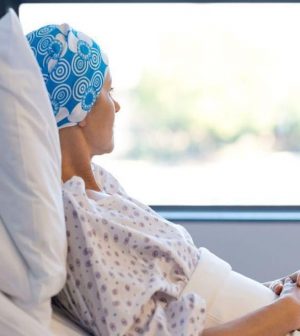- 7 Best Breads for Maintaining Stable Blood Sugar
- Gelatin vs. Collagen: Which is Best for Skin, Nails, and Joints?
- The Long-Term Effects of Daily Turmeric Supplements on Liver Health
- Could Your Grocery Store Meat Be Causing Recurring UTIs?
- Are You Making This Expensive Thermostat Error This Winter?
- Recognizing the Signs of Hypothyroidism
- 10 Strategies to Overcome Insomnia
- Could Artificial Sweeteners Be Aging the Brain Faster?
- Techniques for Soothing Your Nervous System
- Does the Water in Your House Smell Funny? Here’s Why
Cancer Patients May Be at Higher Odds for Rare Neurological Disorder

People with cancer may be at increased risk for a rare neurological disorder called Guillain-Barré syndrome, new research has found.
“Previous studies have suggested there may be a link between cancer and Guillain-Barré syndrome, but just how often people develop Guillain-Barré after a cancer diagnosis has not been well-studied,” explained study author Dr. Lotte Sahin Levison, from Aarhus University Hospital in Denmark.
“While our study suggests that people with cancer have a greater risk of developing Guillain-Barré syndrome, it is important that people with cancer know the overall risk of developing Guillain-Barré is still very small,” Levison added.
Symptoms of the syndrome, in which the immune system attacks nerve cells, typically start with weakness and tingling in the feet and legs, which spread to the upper body and arms and may progress to paralysis. Most people recover with few remaining problems, but the syndrome can be life-threatening.
The exact cause of Guillain-Barré syndrome is unknown, but it can occur after gastrointestinal or respiratory infections.
In a new study, researchers analyzed data on more than 2,400 people in Denmark who were diagnosed with Guillain-Barré over 30 years, and compared them with about 24,000 people who weren’t diagnosed with the syndrome.
The researchers found that 2% of those with Guillain-Barré had a recent cancer diagnosis (up to six months before or two months after a Guillain-Barré diagnosis), compared with 0.5% of those without the syndrome.
Overall, people recently diagnosed with cancer had more than 3.5 times higher the risk of Guillain-Barré than people without cancer.
After adjusting for surgery, infections and other health problems in a subset of study participants, the researchers still found a nearly a three times greater risk of the syndrome in people with cancer.
They also discovered a much higher risk in people with certain cancers: seven times greater in those with lymphomas and blood cancers; 5.5 times higher risk in those with lung or prostate cancer, and five times higher the risk in those with breast cancer.
The study, published online March 2 in the journal Neurology, does not prove that cancer causes Guillain-Barré syndrome. It only shows an association.
“While a majority of Guillain-Barré syndrome cases develop after an infection, there are still many cases that do not,” Levison noted in a journal news release. “More research is now needed. Our results suggest that yet unidentified factors present in several types of cancer may contribute to this increased risk.”
More information
For more on Guillain-Barré syndrome, see the U.S. National Institute of Neurological Disorders and Stroke.
SOURCE: Neurology, news release, March 2, 2022
Source: HealthDay
Copyright © 2026 HealthDay. All rights reserved.










